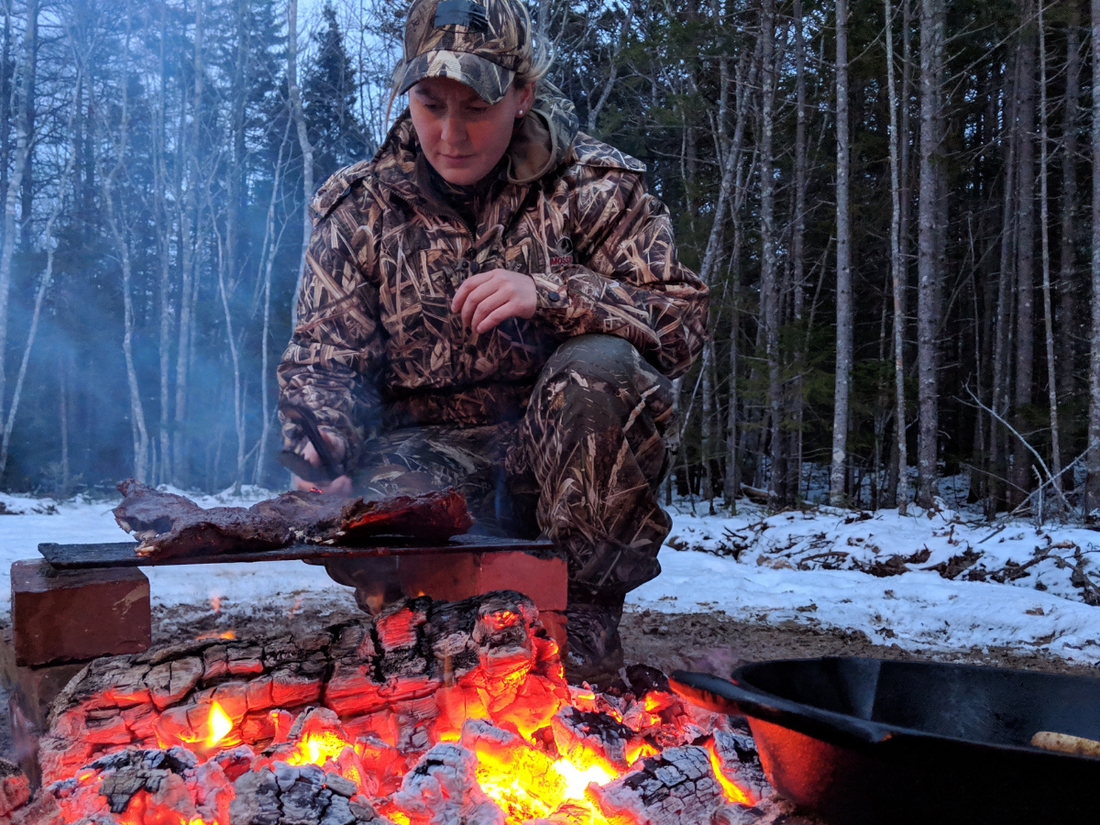Some of the best hunting can come in the worst weather. People who don’t hunt may think we’re fanatics for heading out in snow, biting rain, or brutal heat. But it’s easy to make the weather work for you. Remember, when you’re uncomfortable, the game is usually uncomfortable, too. Let’s learn what that means and how to use it to your advantage.
Use Snow to Your Advantage
In winter, hunting deer can actually be easier in a lot of ways. Spotting is much simpler. Deer can still blend in with the trees, but the camouflage ends there. They stand out a lot more against a blanket of pure white on the ground than they do among a backdrop of dead leaves. Not to mention that it’s easier to track in the snow, too. Fresh tracks, urine spots, deer scrapes, and a blood trail all become easier to follow amidst snowfall.
Wearing white clothing can help you blend in against the snow, if a blizzard kicks up, that’ll camouflage you even further—and the wind will carry your scent away, making you even harder to spot. If you can set up between a bedding area and a food source, you’ll be in businesses. You’ll likely see a lot more movement than normal, and on top of that, you’ll be harder for them to detect.
Finally, the snow can help you haul away your kill. Dragging a deer across a snowy trail is a lot easier than trying to haul it through grassy fields or rocky terrain. You might even be able to use a sled. And the lower temperatures mean that you don’t have to rush as much as you do in hot weather. The snow and cold can help preserve your kill.

Know How Deer Move in Rain
Human beings tend to shut down for rain. Most animals just keep going about their business. Deer are no exception. Unless it’s absolutely pouring buckets, deer just don’t care. During your typical drizzle, they’ll keep to their routine. When you see those telltale signs of a thunderstorm, you should of course stay safe. But you might not need to abandon your trip.
If you can use cover (like a box blind), you should have no problem hunting. In fact, deer tend to move with more confidence when it’s raining. There have been studies that show that deer have a harder time making out sounds when the background noise reaches a certain level. That means that the sound of the raindrops can prevent them from hearing you clearly. The rain may also make you harder to smell, too. In any case, deer don’t seem as skittish about every little tree branch that moves in a rainstorm, and they’ll probably be a lot less interested in your box blind. That means you have a huge advantage.
Be mindful, though. When it’s raining, a blood trail becomes a lot harder to track. Don’t take a shot unless you know it’s a good one. Otherwise, you’re setting yourself up for a hard time.
Know How to Combat Ice When Duck Hunting
Ice can tear up your blinds and spreads, mess up your equipment, and present a hazard to your dogs. However, harsh winter temperatures bring up new birds, as well, that can be easier to hunt. Here are a few tricks to avoiding ice:
- Take to the water, and head upwind. As you approach the shore, you’ll see a ring of ice. Break a large, oblong hole in the ice just off the point with your boat. Toss in your decoys, and you’ve got a fantastic trap for ducks. Keep circling the perimeter to keep the water churned and warm so that your hole stays clear.
- Wade into woods where ducks alight among green timber. If you can break up the ice in the shallow backwaters for the ducks, they’ll return to the same holes they’re used to feeding in instead of abandoning the timber. Clear their feeding ground for them, and they won’t think twice about staying put in their usual stomping grounds.
- Consider an ice eliminator to keep ice from forming in your decoys. These de-icers are submersible pumps that keep water from freezing in fish ponds and boat slips. Not only can these keep ice from forming, but the water disturbance can help make your decoys look like they’re moving.

Consider Ice Fishing
Ice fishing is a great, bracing challenge for anglers. At the same time, it’s not so hard that you need to be a pro. Ice fishing is for everyone. (Just make sure you’ve got appropriate gear for ice fishing.)
You’ll need to drill and maintain a hole or two, but you also don’t have to be an ice sculpture artisan to do that. And in return, you get a beautiful day of fishing in brisk air, and plenty of time, space, and scenery to yourself.
Know How to Eat Well
Most of the food that people bring out into the woods is alright for a quick burst of energy, but it’s not that good for you, in the long run. And when you’re cooped up in freezing weather for hours on end, a hot meal is a lot more appealing than some pre-packaged protein bar.
One of the easiest ways to have a hot meal in the wild is with a camp stove and a just-add-water meal. It’s easy to put together meals at home with partially-cooked ingredients like instant noodles. Adding freeze-dried meats and vegetables into the mix provides protein and other nutrients, and anything in your spice rack at home is fair game to add a little flavor to your recipes.
Just as an example—instant noodles, freeze-dried chicken, and powdered milk can form the basis of a decent campsite fettucine alfredo. All you have to do is boil and add water, and you’ve got yourself a hot meal. It might not be as great as what you can do at home. But it’ll keep you going, and provide a nice, warm respite in your day.

Dress in Layers
Any time you’re going to be spending a lot of time in harsh weather, layering up is important. It isn’t just that you’re protecting yourself from the cold and wet. (That is important, of course.) But you’re also giving yourself options, depending on how your day goes.
Just bundling up can create problems. If the day heats up unexpectedly, or if you wind up exerting yourself, you may wind up sweating a lot. When the sun goes down and the chill settles back in, your clothes are soaked with sweat, which is going to make them extra cold.
Have an Appropriately Sized Tent
If you’re going to stay out in the backcountry, make sure that your tent is the right size. You want your tent to be as small as possible in order to stay warm. If you’re by yourself, use a solo tent. Any empty space is room for cold air.
Insulate your tent with your gear. Keep your bag inside, if there’s room. That’ll help keep cold air at bay.
You can further insulate yourself by putting your outfit for the next day in your sleeping bag with you. Not only will that help keep you warm at night, but it’ll give you a cozy outfit for the next day, as well!

Stay Encouraged and Have Fun
Rain, snow, and ice present plenty of challenges for hunters, but also some of the best opportunities you’ll find. With harsh weather masking your scent and sound, hunting deer can be much easier. And there are plenty of other things to do in the cold too, from duck hunting to ice fishing.
As long as you know how to keep cozy and warm, there’s no reason that a harsh storm can’t be a winter wonderland for a canny hunter.


